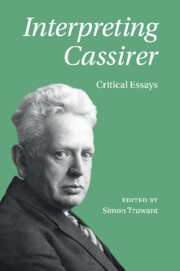Book contents
- Interpreting Cassirer
- Interpreting Cassirer
- Copyright page
- Contents
- Contributors
- Acknowledgments
- Abbreviations
- Introduction
- Part I Cassirer’s Philosophy of Culture
- Chapter 1 Interaction between Language and the Other Symbolic Forms
- Chapter 2 The Status of Art in Cassirer’s System of Culture
- Chapter 3 Being in Time
- Chapter 4 Science As a Symbolic Form: Ernst Cassirer’s Culture of Reason
- Chapter 5 Quantum Mechanics As the Ultimate Mode of Symbol Formation
- Chapter 6 Spirit in the Age of Technical Production
- Chapter 7 Political Myth and the Problem of Orientation
- Part II Cassirer’s Philosophy of Consciousness
- Part III Cassirer’s Philosophical Method
- Bibliography
- Index
Chapter 3 - Being in Time
History As an Expression and Interpretation of Human Culture
from Part I - Cassirer’s Philosophy of Culture
Published online by Cambridge University Press: 17 April 2021
- Interpreting Cassirer
- Interpreting Cassirer
- Copyright page
- Contents
- Contributors
- Acknowledgments
- Abbreviations
- Introduction
- Part I Cassirer’s Philosophy of Culture
- Chapter 1 Interaction between Language and the Other Symbolic Forms
- Chapter 2 The Status of Art in Cassirer’s System of Culture
- Chapter 3 Being in Time
- Chapter 4 Science As a Symbolic Form: Ernst Cassirer’s Culture of Reason
- Chapter 5 Quantum Mechanics As the Ultimate Mode of Symbol Formation
- Chapter 6 Spirit in the Age of Technical Production
- Chapter 7 Political Myth and the Problem of Orientation
- Part II Cassirer’s Philosophy of Consciousness
- Part III Cassirer’s Philosophical Method
- Bibliography
- Index
Summary
Anne Pollok discusses the role of history, historiography, and historicity in Cassirer’s philosophy in this chapter. In contrast to the “objectively teleological” approaches to history offered by Leibniz or Hegel, Cassirer, on the one hand, does not assume an inherent teleology that is merely reflected in culture, but interprets history as a dynamic and progressive movement of the self-liberation of spirit that must be expressed and manifested by cultural means. Hence, the historian must actively engage with our cultural past as a means to elucidate our current standing and inform our future development. Contrary to Heidegger, on the other hand, Cassirer sees this process of self-liberation not as an existential struggle, but assumes that a proper relation to our history offers a valid answer to the demands of the present. Pollok hereby demonstrates that historical reconstruction elucidates the basic communal and intersubjective structure of symbol formation, thus transcending the limits of the historian’s time and elucidating the complex system of human symbolic formation in culture.
- Type
- Chapter
- Information
- Interpreting CassirerCritical Essays, pp. 53 - 71Publisher: Cambridge University PressPrint publication year: 2021

